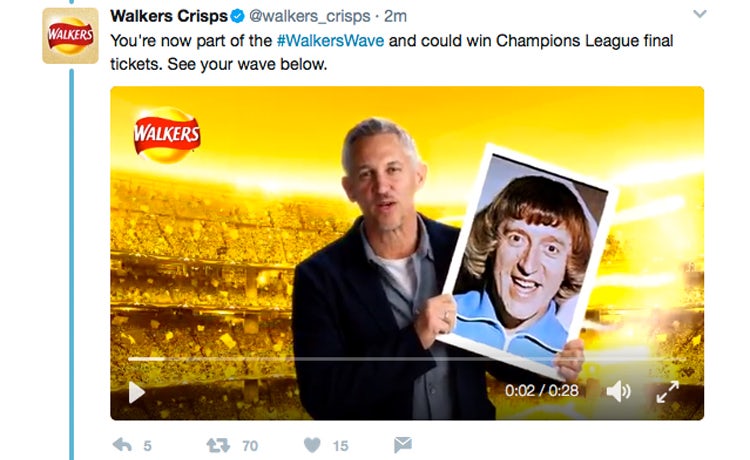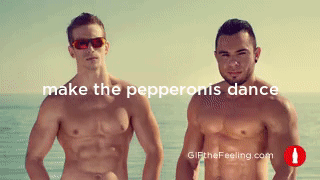A customisable campaign that puts your followers directly into the campaign seems like a good idea, right?
It drives engagement and get consumers interacting with and actively endorsing your brand.
At least, that’s the plan.
The marketing bods at Walkers Crisps, an official UEFA Champion’s League sponsor, must have thought fans would play ball when they unveiled the #WalkersWave’ this week which invited users to submit selfies that were superimposed on a crowd participating in a Mexican wave alongside a virtual Gary Lineker. The videos were created dynamically and pushed onto the Walkers Twitter feed.
So, what images did people submit? Pictures of themselves? Pictures of their Nan? No, in a classic case of campaign hi-jack, people submitted images of notorious serial killers, sex offenders and a whole host of unsavoury characters. Poor pixelated Gary Lineker was pictured holding up these ‘selfies’ again and again across social media until the brand finally deleted the videos and halted campaign activity completely.

To make matters worse, Walkers had set up an experiential marketing pop-up on Queen Street in Cardiff, where fans could participate in real time. The wave was projected on a large digital billboard outside the pop-up event… and shared some of the videos from the hijacked social campaign.
This all sounds pretty detrimental to the brand’s identity, but this shouldn’t have any long-term damage to the Walkers brand itself. Many people actually enjoy seeing brands make a mistake in such a public forum, and these viral hijacks are rarely ever a bad thing. The same could be said about Gary Lineker’s own personal brand, while it may take a hit temporarily, we believe consumers will recognise that, like Walker’s, this was not his doing and that there was no malicious intent intended. The campaign was merely a light-hearted way of promoting an international event on British soil.
Walkers isn’t the first brand to have their social media campaign hijacked by viral trolls. Here’s some of the funniest rogue social media campaigns from recent years:
Boaty McBoatface – #NameOurShip
The Natural Environment Research Council’s (Nerc) #NameOurShip campaign called on the public to submit and vote for the name of a £200m Royal Research ship. The campaign gained so much momentum on social media that it actually broke the Nerc’s website as people voted in floods for the ship to be called ‘RSS Boaty McBoatface’.
Unfortunately, the winning name was overturned in favour of the ship being named ‘RSS David Attenborough’, to many people’s dismay.
I Shop at Waitrose…
In an innocent enough campaign, up-market supermarket chain Waitrose invited their shoppers to finish the sentence ‘I Shop at Waitrose because…’ with the accompanying hashtag #WaitroseReasons. Instead of listing reasons why customers chose to shop at the chain, the hashtag was highjacked by individuals mocking the high prices and the types of clientele that are stereotypical customers of the chain with highlights such as “”I shop at Waitrose because it makes me feel important and I absolutely detest being surrounded by poor people” and “I also shop at Waitrose because I was once in the Holloway Road branch and heard a dad say ‘Put the papaya down, Orlando!'”.
#GIFTheFeeling
Coca-Cola faced a tumblr hijack in early 2016 following its #GIFTheFeeling, releasing an online gif maker to promote their new ‘Taste the Feeling’ strapline. This provided fans of the fizzy soft drink with a number of templates where they could overlay a ‘feeling’ on top of the images.
Here are some of the best creations:


Aldi – Fill in the Blank
ALDI Austrailia suffered a similar fate to Waitrose in January 2016. The company asked twitter followers to tell them they “became an ALDI lover when they tasted _________ for the first time”. Naturally, you can imagine the kind of tone this campaign took…
Have any of these brands suffered due to their embarrassing hijacked social media campaigns? Not really. People still drink Coke and shop at Waitrose. I’ll still buy cheese and onion Walkers’ crisps. It’s a case of misjudgement rather than crisis. They may have lost a few followers but ultimately they have shown a human, fallible side and that can be far more positive than any planned campaign. The lesson here is, no matter how big your brand and how many advocates you have, when it comes to encouraging social participation from the public don’t take for granted that people will treat you kindly.
What are your favourite social media fails from recent years?
Pingback: My Content Cocktail – Beksky()